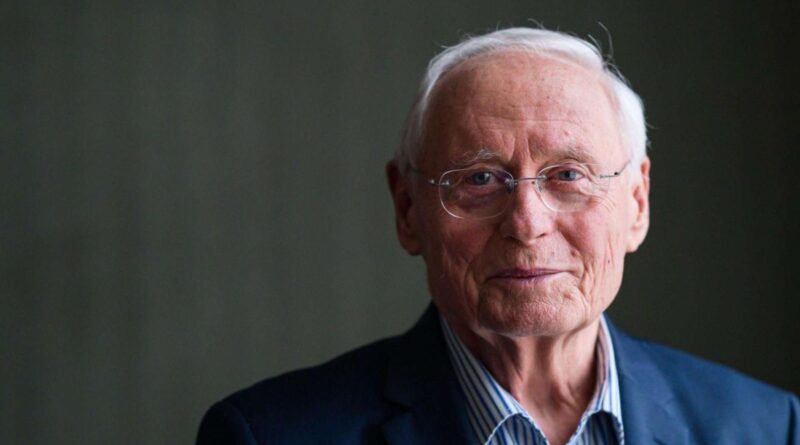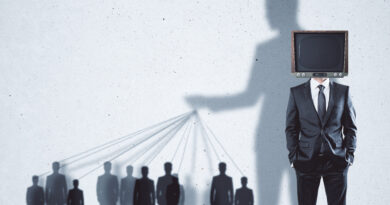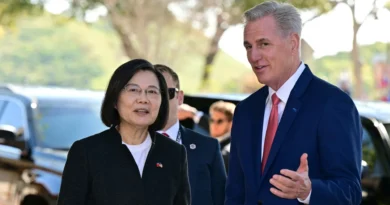Oskar Lafontaine: Germany must recognize that it has different interests than the US
FLORIAN ROTZER
Berlin
Former SPD chairman, chancellor candidate and finance minister in Germany was one of the first to sign the "Manifesto for Peace" initiated by Sahra Wagenknecht, Alice Schwarzer and Erich Vad, which urges the federal government to enter into negotiations between Russia and Ukraine to establish a ceasefire instead of continuing the spiral of escalation to hand over weapons and which have so far signed more than 600.000 people. in his book “Ami, it's time to go” which has now been updated with another essay, Lafontaine is in favor of an end to arms deliveries and the start of serious efforts in peace negotiations and advocates that France and Germany, in particular, develop an independent European security policy and break with the war policy of the United States .
The philosopher Jürgen Habermas has also intervened in the German debate, criticizing the vague ideas of supporters of the war about a victory for Ukraine and advocating a perspective of negotiation to end the war of attrition.
GERMANY SHOULD IMMEDIATELY STOP ARMS DELIVERIES
He has written a new chapter on the Ukrainian war for his book Ami, it's time to go, warning that a great conflict may be imminent. They demand a ceasefire and peace negotiations. Should Germany immediately stop arms deliveries?
Oscar Lafontaine: Definitely, because these deliveries of weapons do not lead to any final results in the sense that, in the opinion of the military, they will decisively change the situation there. In essence, every day is a day lost as more and more people die, and anyone helping to prolong the war must be aware of this responsibility. More and more people are also dying as a result of political mistakes. It is unfortunate that, according to former Israeli Prime Minister Bennett, the West frustrated last spring's ceasefire negotiations, which were almost complete.
Yes, that should have been in April 2022. After Bucha, the Ukrainian willingness to negotiate finally came to an end. One argument of those who say Ukraine must continue to receive military support is that otherwise Russia will go further and take over Ukraine completely or even attack EU countries. What would you say about that?
Oscar Lafontaine: The supply of weapons made the war last for a year, 200.000 soldiers died and 50.000 civilians were victims of the war. The ceasefire and peace negotiations would prevent all of Ukraine from being occupied. Whoever says that Russia will attack EU countries also claims that NATO's guarantee of protection is an empty promise.
If the arms deliveries stopped now, how could the talks start? At the start of the war, the then Israeli Prime Minister Bennett appears to have mediated. Who could now have the opportunity to influence both sides?
Oscar Lafontaine: All states not suspected of taking sides are eligible. Israel is one of them. There have also been advances from the Vatican, for example, and from Lula, the new president of Brazil. China is also interested in ending the war. So, there are different ways to negotiate with the conflicting parties to reach an armistice. When I speak of the parties to the conflict, I mean above all the United States and Russia. There is also a new ray of hope because the Rand Corporation think tank, which is close to the Pentagon, has now proposed ending the war through negotiations due to the threat of escalation.

This could also happen when the US election campaign begins. But how could a ceasefire be? Should Russia withdraw from the occupied territories? Would Russia have to give up Donbas and Crimea?
Oscar Lafontaine: First of all, the decisive factor is a ceasefire, which, however, does not answer these questions. Weapons would simply cease and then people would no longer die. You can't say that often enough because all the discussions revolve around guns or land justice without seeing the death and misery of the people. When death is over, negotiations can begin. The reasoning behind the two Minsk agreements is still valid. I repeat it again: the neutrality of Ukraine. In any case, Russia will no longer hand over Crimea. But you could also repeat a vote there. The vote was always in favor of Russia. In Donbas, the population could also be allowed to vote wherever they want, of course under international supervision. It amazes me that this issue, of course, that people in the disputed parts of the country can vote, doesn't get out there and everyone thinks they can decide where they want to go. The argument that the borders should be immovable has already been abandoned in Yugoslavia, as we all know.
It is remarkable that a renowned philosopher of law like Reinhard Merkel says that, in his opinion, if you now want to reconquer Crimea and go to war, this would also violate international law.
THE PENTAGON HAS A “DISINFORMATION ARMY” OF 27.000 PEOPLE
He has endorsed Emmanuel Todd's thesis that World War III has already begun. What do you mean by that?
Oscar Lafontaine: The thesis cannot be reduced to a military conflict between the superpowers with bombs and rockets, but the war is being waged on a wide variety of levels. There is no denying the economic war that is being waged globally, particularly between China and the United States. Now there is an economic war of the West against Russia. In addition, and this aspect has been neglected up to now, there is a constant information war.
In my essay, which I have now added to the book, I point out that the Pentagon employs 27.000 people who provide information to the media and spread the American perspective and propaganda around the world. When I read number 27.000 for the first time, it was published by the American press agency AP, at first I didn't want to believe it, but there is this army of misinformation. This is the only way to explain why the Pentagon and Western propaganda managed to date the start of the war to February 24 last year, while many insiders know that the war started no later than 2014, when a government in Kiev that began to oppress the Russian minority. Basically, the cause of the war goes back to the beginning of NATO's eastward expansion. US politicians such as George Kennan have argued that NATO's eastward expansion will lead to nationalism and militarism. And this nationalism and militarism has now broken out in the form of war.
What would you accuse the federal government, especially Chancellor Scholz, of doing or having done wrong?
Oscar Lafontaine: It is crucial that the federal government acted oblivious to history and overlooked Germany's geostrategic position. In reality, it should be a matter of course that Germany does not supply weapons that are used to kill people in countries that have been invaded by Hitler's armies and suffered millions of deaths. Why have we not drawn this conclusion from our history? Second, it goes without saying that we fight anti-Semitism wherever it occurs and do not cooperate with anti-Semitic forces. It is no secret that in the Ukraine Stepan Bandera is being elevated to the status of a national hero, who is partly responsible for the mass murders of Jews and Poles. And third, in our own interest, we must not participate in the US-led encirclement of Russia.
THE WILLY BRANDT DETENT POLICY HAS BEEN REMOVED TOTALLY
It has been said for some time that Germany should take a leading role. It is then also called responsibility, which is usually understood in a military sense. Due to its history, Germany could take a leading role with regard to a peace solution. Why nothing happens in this regard?
Oscar Lafontaine: The big surprise is that the parties that have long felt committed to the policy of peace have fundamentally changed their policy. The Greens, sprung from the peace movement, are currently the worst warmongers. The SPD has completely abandoned the policies of Willy Brandt. Instead of disarmament and peace, war has now become a political tool for the social democrats. And, according to SPD Chairman Klingbeil, they want to create security in Europe against Russia. That is the total elimination of Brandt's détente policy and eastern policy. The FDP has forgotten about the policy of Genscher, who said in one of his last interviews after the annexation of Crimea: We need peace and compromise with Russia, we have to keep talking with them.
What would you say to the demand, which of course comes from the Ukraine, but is also represented by the German Foreign Minister, Annalena Baerbock, that a special court be established to punish Russian war crimes? Of course, the Ukrainians are not mentioned.
Oscar Lafontaine: But that shows Ms. Baerbock's double standards. She once dealt with issues of international law, but she obviously doesn't know the principle that the law applies equally to everyone. Otherwise, they would have to concede that the German politicians responsible for participating in the Yugoslav war, which also violated international law and resulted in death, would also have to appear before that court. Ultimately, she would have to summon the former foreign minister of the Greens, Joschka Fischer, before that court. This example shows just how contradictory, ridiculous, and unbelievable green foreign policy has become.
There are always German interests behind it, including geopolitical interests. Where would I see them?
Oscar Lafontaine: The Federal Republic must recognize that it has different interests from those of the United States and, of course, from those of China or Russia. And to enforce it, he has to find allies. That is why I continue to believe that Germany and France must work together to give weight to European interests in a multipolar world. The United States managed to build a new Washington-London-Warsaw-kyiv axis, which changed the balance in NATO. Here I agree with the French intellectual Emmanuel Todd. In recent months, this axis has significantly contributed to the fact that demands for new weapons have been repeatedly launched and finally met. Now we are supposed to deliver combat aircraft, then it will be about long-range missiles, until at some point there is a demand for the deployment of ground troops. This fatal dependence on European decisions on this new axis must be broken.
Of course, this also includes the fact that Seymour Hersh claims to have proven that the Americans destroyed the Nord Stream. The federal government must stop cowardly dodging this issue and finally say whether it accepts that the US through its president declared that it would end the Nord Stream and finally did so.
THE US HAS ACHIEVED THAT THE GEOSTRATEGIC INTERESTS OF EUROPE STOP BEING NOTICED
There is definitely a broken mood in Germany when it comes to arms deliveries and the war in Ukraine. But at the same time there is relatively little resistance, only from the AfD and the left in parliament. Otherwise, the peace movement has hardly been heard here until now. Why do you think that is?
Oscar Lafontaine: I believe this is due to Washington's successful disinformation war. Therefore, it is also important to refer to the great information army of the USA, which has managed to make the geostrategic interests of the Europeans cease to be perceived. And this constant propaganda, which is also reflected in the fact that the vast majority of the German media are beating the war drum, means that resistance is low. Now there is the manifesto of Alice Schwarzer and Sahra Wagenknecht, which has the support of 600.000 people. On the other hand, the generals also say, above all, Mark Milley - the best soldier in the USA - but also the long-standing Inspector General of the German Armed Forces, Harald Kujat, or the former brigadier general Erich Vad - military adviser for a long time of Angela Merkel - that everything speaks in favor of ending this war now and finally reaching a ceasefire. This offers hope that at some point the military will be able to convince politicians that the constant beating of the drums of war and the constant supply of new weapons are no longer justifiable.
NEOLIBERALISM HAS CHANGED THE SOCIAL NATURE OF SOCIETY
It is interesting that you are now pinning your hopes on the army. On the other hand, he also says that he has the impression that the sympathy of people in society has practically disappeared. That would also set up some kind of warlike mood or a competitive fight against each other. How do you determine the disappearance of compassion?
Oscar Lafontaine: There is an indication that the so-called neoliberalism has changed the social character of society. This is a term introduced by Erich Fromm in social psychology. In a nutshell, one can put it this way: if people live in a society in which everyone is their own neighbor and dominates the struggle of all against all, then this also means that compassion, which is innate in people , does not develop or is suppressed and that, therefore, there is very little resistance. People are not only dying in Ukraine. There are many countries where wars are being fought, now in Yemen for example, or more recently in Syria. Right now, after the catastrophic earthquake, we have every reason to end the disastrous sanctions against Syria first, to help the people there.
He makes a connection between neoliberalism and the waning sense of compassion. Were there times when things were different?
Oscar Lafontaine: I believe that the institutions that once conveyed compassion and encouraged collective action are in retreat. For example, the unions, which years ago were still opposed to the war. At the moment, the German trade unions are playing a pathetic role. They seem to have forgotten that preventing workers from shooting workers has been a major concern of unions since their inception. Why don't unions fight for people who die through no fault of their own on the battlefields of Ukraine or other countries around the world? Or I am thinking, for example, of the churches, which had a much stronger social function after the war than they do today and encouraged people to notice other people's suffering. The bishops advocate today for arms shipments.
Such significant institutions or organizations have lost influence. On the other hand, the daily practice of neoliberalism has entered the workplace. In the past, many businesses that were based on normal employment still felt like communities that saw each other as belonging. But as agency workers are employed and fixed-term employment grows, this community-building workplace organization has also diminished. And the consequences are yet to be seen.
Do you see any signs right now that such institutions might be re-emerging?
Oscar Lafontaine: The prerequisite would be to recognize that there has been a change in the world, even in society, because the capacity for compassion has diminished. Basically, this should have been discussed at the time when Alexander and Margarete Mitscherlich wrote the book “The inability to cry”, because the inability to cry is preceded by the inability to suffer. Such societal developments need to be addressed, then one can also discuss what society as a whole can do to keep this idea alive. Hence the reference to the organization of the world of work. But at the moment there are no signs that thinking is changing.
Then a new internationalism would have to emerge. At the moment, people seem overwhelmed by the world's suffering and prefer to ignore it. In the Ukraine alone, hundreds of thousands have probably died since the war began.
Oscar Lafontaine: Yes, a new internationalism would also be necessary. I have tried to make this clear in my new essay on the Franco-German relationship and suggest that efforts be made to experience each other's culture more intensely. When we recognize that Germany and France must work together to assert the interests of Germany, France and Europe in the world, and when we recognize the structural problem of the new Washington-London-Warsaw-Kiev axis and the associated need for change, then we have to transmit that culturally. The old idea that culture unites peoples must be revived if we are to launch a new internationalism.
At the moment, it seems that cancel culture dominates, that is, people do not unite people, but separate them.
Oscar Lafontaine: Cancel culture is an expression of the undesirable development of our society. Intolerance and the addiction to excluding others are on the rise. A veritable language police force has developed, waiting to see if someone says the wrong word or sentence. Then the shit storm begins. We have to relearn to understand the other and to feel with him.
Oskar Lafontaine he was born on September 16, 1943. Two years later he lost his father, who died as a soldier at the age of 29. In the course of his political life he was mayor of Saarbrücken, prime minister of the federal land of Saarland, chairman of the SPD, candidate for chancellor and federal minister of finance. In March 1999 he resigned from all his posts in the SPD in disagreement with Gerhard Schröder's policy and was one of the founders of the Die Linke party.
Florian Rotzer is a German author and publicist specializing in media theory. He has been editor-in-chief of the German digital publication Telepolis.
This interview is published in collaboration with the German magazine Overtone









